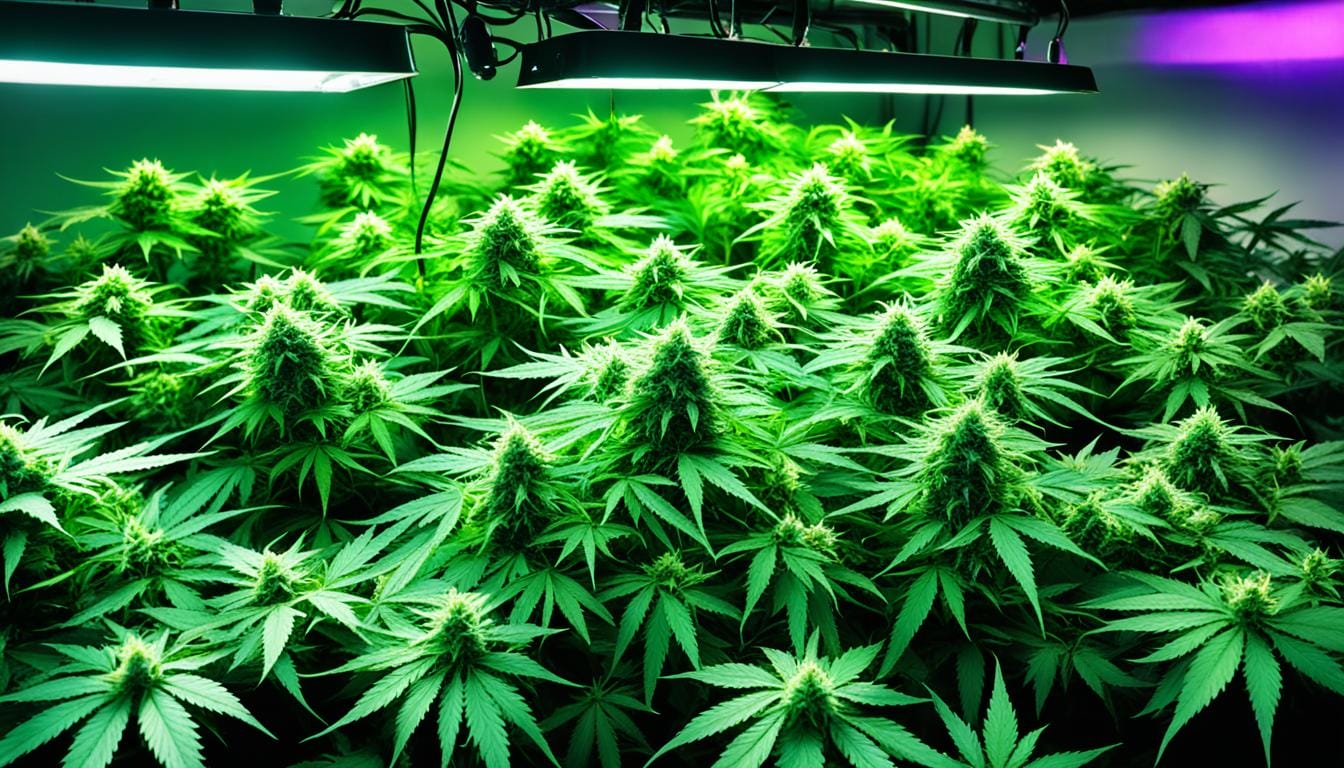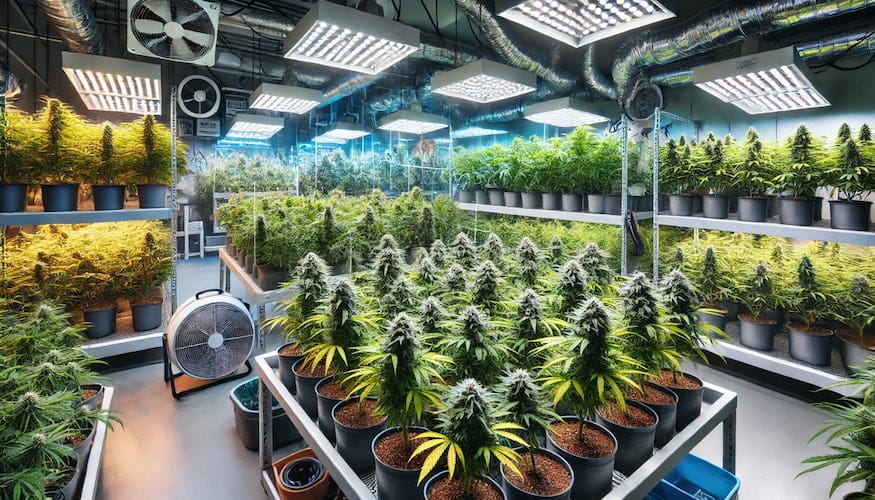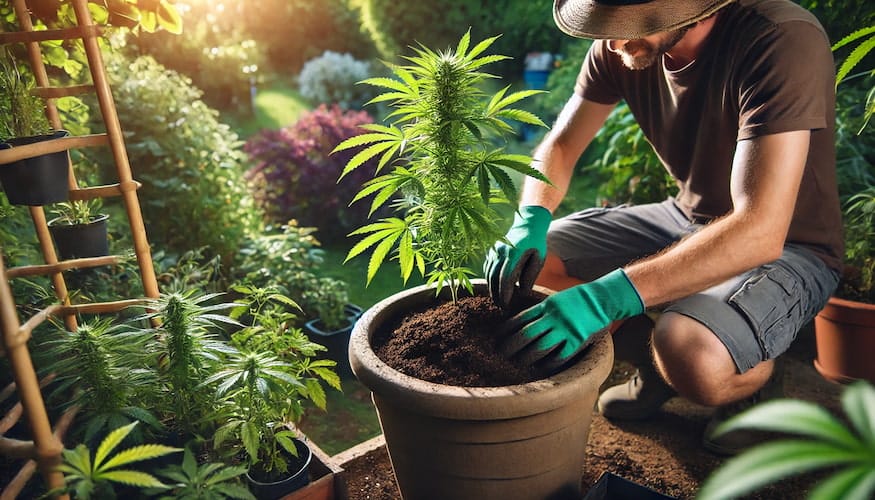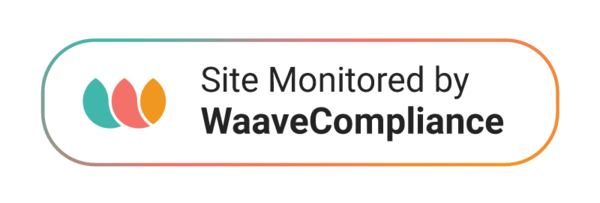Master the optimal lighting needs for cannabis growth with our expert guide on advanced grow light setups for healthier plants and better yields.
Essential Growing Equipment for Thriving Gardens
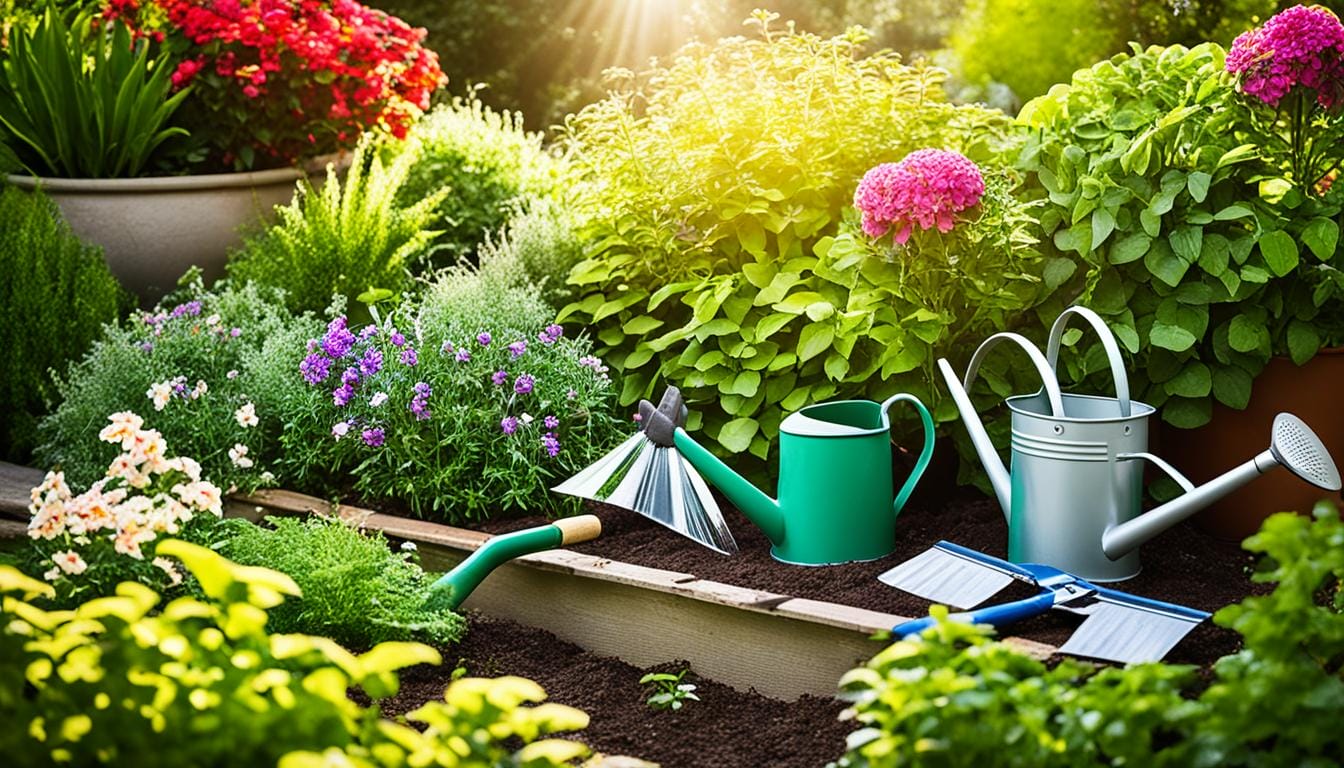
Did you know that using the right gardening equipment can increase your plant’s yield by up to 30 percent? Investing in essential growing equipment is crucial for creating a thriving garden, whether you’re a seasoned horticulturist or just starting out with your green thumb. In this article, we will explore the key tools and accessories you need to foster healthy plant growth and maximize your gardening success.
Key Takeaways:
- Choosing the right gardening equipment is essential for maximizing plant yield and overall gardening success
- Indoor gardens require specific supplies like hydroponic systems, grow lights, and plant nutrients
- Hydroponic systems enable plants to grow without soil, offering a space-saving and efficient solution for indoor gardening
- Grow lights provide the necessary light spectrum for photosynthesis, promoting healthy plant growth and development
- Plants need a balanced supply of nutrients, and choosing the right plant fertilizers and supplements can enhance their growth and health
Indoor Garden Supplies
When it comes to indoor gardening, having the right supplies is essential to create the optimal growing conditions for your plants. Whether you’re a seasoned indoor gardener or just starting out, there are a few key items you’ll need to ensure your plants thrive.
- Hydroponic Systems: Hydroponics is a popular method for indoor gardening that allows plants to grow without soil. These systems provide plants with a nutrient-rich water solution, promoting faster and more abundant growth. They are perfect for growing herbs, vegetables, and even flowers in limited spaces.
- Grow Lights: Indoor plants need sufficient light to photosynthesize and grow. Since natural light may not always be available or adequate, grow lights are a must-have for indoor gardens. LED and fluorescent lights are commonly used, providing the necessary light spectrum for different stages of plant growth.
- Plant Nutrients: To ensure your plants receive the right balance of essential nutrients, consider adding plant nutrients to your indoor garden supplies. Fertilizers and supplements enriched with minerals and microorganisms can enhance plant growth, flowering, and fruiting. These supplements help replenish nutrients that may be lacking in indoor environments.
Create the Ideal Environment
By incorporating hydroponic systems, grow lights, and plant nutrients into your indoor garden supplies, you can create an environment that supports healthy and vigorous plant growth. These supplies are readily available in gardening stores and online, making it convenient to get started on your indoor gardening journey.
“Indoor gardening allows you to enjoy the beauty and benefits of plants all year round, even in limited spaces. With the right supplies, you can create a thriving indoor garden that not only enhances your living spaces but also provides fresh produce and a calming ambiance.”
To give you a better idea of what these indoor garden supplies entail, take a look at the table below:
| Indoor Garden Supplies | Description |
|---|---|
| Hydroponic Systems | A soilless method of growing plants that uses a nutrient-rich water solution. |
| Grow Lights | Artificial lights that provide the necessary light spectrum for plant growth. |
| Plant Nutrients | Fertilizers and supplements that enhance plant growth and flowering. |
With these essential indoor garden supplies, you can create a thriving indoor garden that brings the joy of nature into your home. Incorporate these tools into your gardening routine and watch as your plants flourish in their indoor oasis.
Hydroponic Systems
Hydroponic systems have gained significant popularity among indoor gardeners, offering a soil-free alternative to traditional gardening. These systems utilize water and nutrient solutions to provide plants with the essential elements they need for growth. Let’s explore the different types of hydroponic systems and understand how they benefit plant cultivation.
Nutrient Film Technique (NFT)
The nutrient film technique (NFT) is a popular hydroponic system that involves a continuous flow of a thin nutrient solution over the plant roots. In this system, plants are placed in a shallow, sloping channel, allowing the nutrient-rich film to flow past the roots, providing them with water and essential nutrients. This method encourages rapid growth and is suitable for growing leafy greens and herbs.
Drip Irrigation System
The drip irrigation system is one of the most widely used hydroponic systems. It involves using a pump to deliver a nutrient solution to individual plants through a network of tubes and emitters. Each plant receives a regulated amount of nutrient solution at regular intervals, creating a controlled environment for optimal growth. This system is versatile and suitable for a wide range of plants, making it a popular choice among hydroponic gardeners.
Deep Water Culture (DWC)
The deep water culture (DWC) system is a simple yet effective hydroponic technique. Plants are suspended above a nutrient solution-filled reservoir, with their roots submerged in the water. Oxygen is supplied to the roots through air stones or bubblers, ensuring they receive the necessary oxygen for proper development. This system is ideal for growing plants like lettuce, herbs, and small vegetables.
Aeroponics
Aeroponics is an advanced hydroponic system that suspends the plant roots in the air and provides them with a fine mist of nutrient solution. This mist is sprayed directly onto the roots, ensuring optimal nutrient absorption and oxygenation. The absence of a growing medium allows for accelerated growth and efficient nutrient uptake by the plants. Aeroponics is suitable for a variety of crops, especially those with delicate roots.
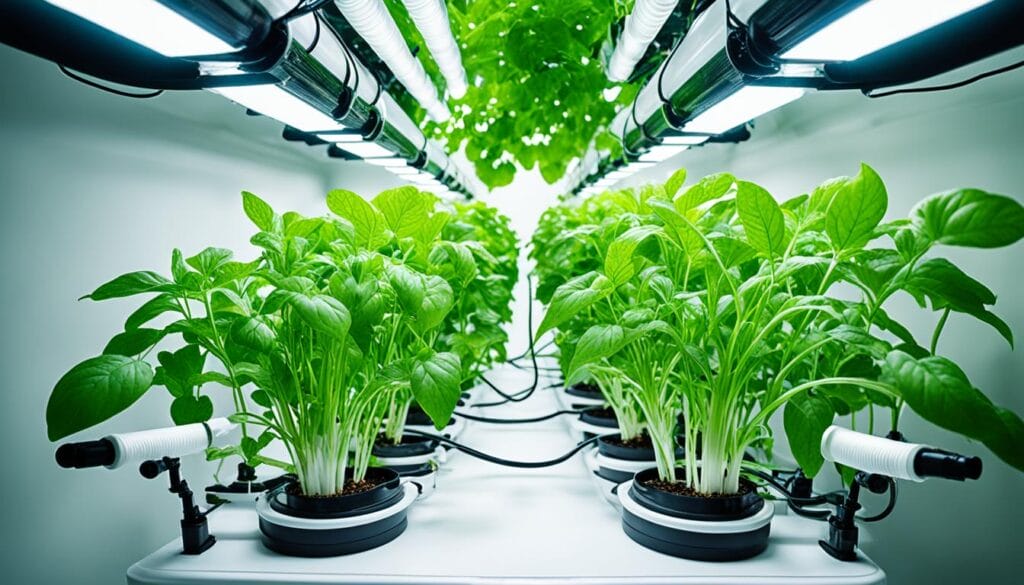
Benefits of Hydroponic Systems
- Enhanced plant growth and yield due to direct access to nutrients
- Conservation of water as it is recirculated in the system
- Elimination of soil-borne diseases and pests
- Efficient use of space, making hydroponic systems ideal for indoor gardening
- Year-round cultivation regardless of weather conditions
With the various hydroponic systems available, gardeners can choose the system that best suits their plant varieties and space constraints. Whether you’re a seasoned indoor gardener or a beginner, hydroponic systems offer a sustainable and efficient way to nurture healthy plants and enjoy the benefits of fresh produce right at home.
Grow Lights
In indoor gardening, proper lighting is essential for plants to thrive. That’s where grow lights come in. These specialized lights mimic the spectrum of natural sunlight, providing plants with the light they need to undergo photosynthesis effectively. By using grow lights, you can create the ideal conditions for your plants to grow and flourish, even in spaces with limited sunlight.
When it comes to choosing the right grow lights for your indoor garden, you have a variety of options. Two popular types of grow lights are light-emitting diode (LED) and fluorescent lights. Let’s explore their features:
LED Grow Lights
- Energy-efficient and long-lasting
- Produce low heat, reducing the risk of plant damage
- Available in a range of colors to support different stages of plant growth
- Can be easily adjusted for specific light intensity and spectrum requirements
Fluorescent Grow Lights
- Cost-effective and widely available
- Produce less heat, making them suitable for use in small spaces
- Available in different types, such as T5 and CFL, catering to various plant needs
- Provide a balanced spectrum of light suitable for general plant growth
Ultimately, the choice between LED and fluorescent grow lights depends on your specific gardening needs and budget. Consider factors such as the size of your growing space, the types of plants you’re growing, and the amount of energy you’re willing to invest. It’s also worth noting that some gardeners use a combination of both types for optimal results.
To create the best lighting setup for your indoor garden, it’s important to consider factors like light intensity, duration, and distance. Each plant has its own unique light requirements, so it’s essential to research the needs of the specific plants you’re growing.
| Grow Light Type | Pros | Cons |
|---|---|---|
| LED | Energy-efficient and long-lasting | Higher upfront cost |
| Fluorescent | Cost-effective and readily available | Produce less intense light compared to LEDs |
Remember, the success of your indoor garden relies on providing your plants with the right amount and quality of light. With the correct grow lights and optimal lighting conditions, you can create a thriving indoor garden that brings joy and beauty to your home.
Plant Nutrients
Plants require a balanced supply of nutrients to thrive. These nutrients play a vital role in supporting their growth and overall health. In this section, we will delve into the importance of plant nutrients and explore different types of fertilizers and supplements that can help enhance the growth and vitality of your plants.
The Importance of Plant Nutrients
Just like humans, plants need a diverse range of essential nutrients to function optimally. These nutrients are necessary for various physiological processes, including photosynthesis, root development, flowering, and fruiting. Without an adequate supply of nutrients, plants may exhibit stunted growth, and discoloration, or be more susceptible to pests and diseases.
To ensure that your plants receive the necessary nutrients, it is important to enrich the soil or growing medium with fertilizers and supplements. These products provide plants with the essential elements they need in the right proportions, promoting healthy growth and robust yields.
Types of Plant Nutrients
Plant nutrients can be classified into three main categories: macronutrients, micronutrients, and secondary nutrients.
| Macronutrients | Micronutrients | Secondary Nutrients |
|---|---|---|
| Nitrogen (N) | Boron (B) | Calcium (Ca) |
| Phosphorus (P) | Copper (Cu) | Magnesium (Mg) |
| Potassium (K) | Iron (Fe) | Sulfur (S) |
| Manganese (Mn) | ||
| Molybdenum (Mo) | ||
| Zinc (Zn) |
Macronutrients are required in larger quantities and include nitrogen (N), phosphorus (P), and potassium (K), often referred to as NPK. These nutrients support the overall growth and development of plants.
Micronutrients are needed in smaller amounts but are equally important for plant health. They include elements such as iron (Fe), manganese (Mn), and zinc (Zn), among others. Micronutrients regulate various metabolic processes and contribute to the synthesis of important compounds within the plant.
Secondary nutrients, including calcium (Ca), magnesium (Mg), and sulfur (S), are also crucial for plant growth. While plants require these nutrients in lesser quantities compared to macronutrients, they are still vital for optimal development.
Choosing the Right Fertilizers and Supplements
When it comes to providing plant nutrients, there are various fertilizers and supplements available on the market. The selection depends on your specific gardening needs and the requirements of your plants.
Some common types of fertilizers include:
- Organic Fertilizers: Derived from natural sources, organic fertilizers provide a slow release of nutrients and improve soil health over time.
- Synthetic Fertilizers: These fertilizers are manufactured and contain specific nutrient ratios to address particular plant needs. They provide quick-release nutrients and are typically water-soluble.
- Foliar Fertilizers: These fertilizers are applied directly to the leaves of plants, allowing for rapid absorption of nutrients.
In addition to fertilizers, supplements such as compost, manure, and bone meal can also be used to enrich the nutrient content of the soil.
Garden Tools
Proper gardening tools are essential for maintaining and nurturing your plants. Having the right tools not only makes your gardening tasks easier but also ensures the health and longevity of your plants. In this section, we will provide an overview of the must-have garden tools and offer tips on their usage to ensure efficient gardening practices.
1. Shovels
Every gardener needs a good shovel. Whether you’re digging holes for planting, moving soil, or removing weeds, a sturdy shovel is a must-have tool. Look for a shovel with a comfortable grip and a strong, durable blade. A pointed shovel is ideal for digging and loosening soil, while a flat-edged shovel is great for moving and leveling soil.
2. Pruners
Pruners, also known as secateurs, are essential for maintaining the health and shape of your plants. They allow you to trim branches, remove dead or diseased stems, and shape your plants with precision. When choosing pruners, opt for a bypass style that cuts like scissors, providing clean and precise cuts. Make sure to keep your pruners clean and sharp for optimal performance.
3. Watering Cans
Watering cans are a practical and efficient way to water your plants. They provide a gentle and controlled flow of water, preventing overwatering and reducing the risk of damaging your plants. Look for a watering can with a long spout and a comfortable handle for easy maneuverability. Consider investing in a watering can with a removable rose attachment, allowing you to switch between a gentle shower and a direct stream.
4. Garden Gloves
Protect your hands while gardening with a pair of sturdy garden gloves. Gloves provide a barrier between your skin and potential irritants such as thorns, allergens, and chemicals. They also offer additional grip and prevent blisters and calluses. Choose gloves made from durable materials such as leather or synthetic fabrics, and make sure they fit snugly for maximum comfort and dexterity.
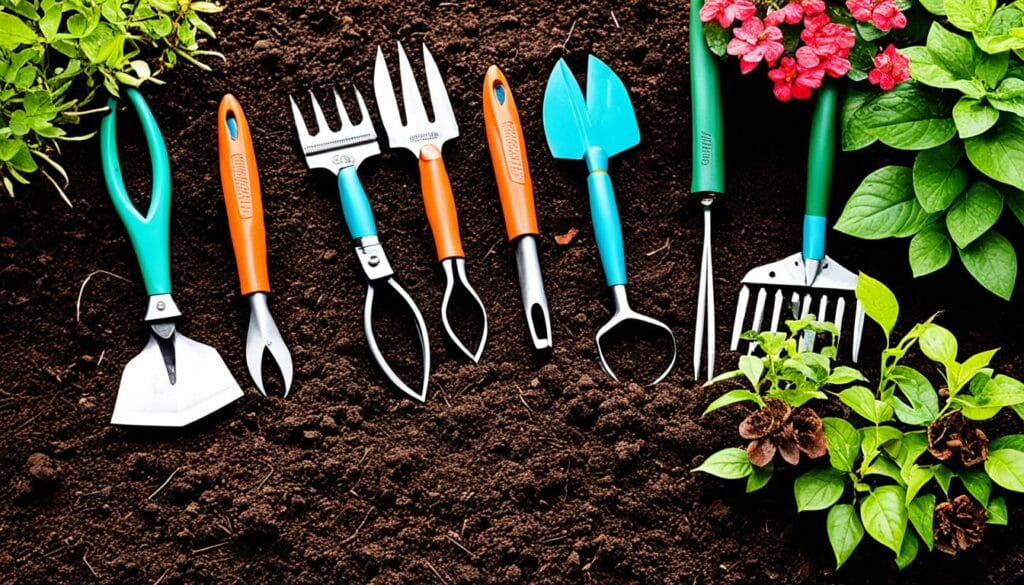
5. Garden Forks
6. Rakes
7. Pruning Saw
8. Trowels
9. Garden Hoses
10. Wheelbarrow
These are just a few of the essential garden tools that every gardener should have. By equipping yourself with the right tools and using them correctly, you’ll not only make your gardening tasks more efficient but also increase the overall success of your garden.
Gardening Accessories
Gardening is not just about having the right tools; it’s also about having the right accessories to enhance your gardening experience. These gardening accessories can make your time in the garden more enjoyable, efficient, and organized. Let’s explore some essential gardening accessories that every gardener should consider:
Gloves
Protect your hands from thorns, splinters, and sharp edges with a pair of durable gardening gloves. Whether you’re pruning, planting, or weeding, gloves provide the necessary protection while allowing you to maintain a firm grip on your tools. Choose gloves made from high-quality materials like leather or synthetic fibers for maximum durability and comfort.
Knee Pads
Save your knees from strain and discomfort with a pair of knee pads. Gardening often requires kneeling or crouching, which can take a toll on your joints. Knee pads provide cushioning and support, allowing you to tend to your plants for longer periods without discomfort. Look for knee pads with adjustable straps for a secure and customized fit.
Plant Markers
Keep track of your plants and maintain an organized garden with the help of plant markers. These handy accessories allow you to label your plants, noting their names, varieties, and planting dates. Plant markers can be made from various materials like wood, plastic, or metal, and some even come with erasable surfaces, allowing you to update the information as needed.
Tool Belt or Apron
Stay organized and keep your tools within reach by using a tool belt or apron. These accessories come with multiple pockets and compartments to hold your gardening tools, seeds, and other small essentials. With a tool belt or apron, you won’t waste time searching for your tools and can focus more on the task at hand.
Pruning Shears Holster
Pruning shears are an essential tool for maintaining the health and shape of your plants. To keep your pruning shears within easy reach, consider investing in a pruning shears holster. This accessory attaches to your belt or waistband and securely holds your pruning shears, allowing you to quickly access them whenever needed.
| Gardening Accessory | Features |
|---|---|
| Gloves | Protection from thorns and sharp objects |
| Knee Pads | Cushioning for kneeling and crouching |
| Plant Markers | Labeling plants for organization |
| Tool Belt or Apron | Convenient storage for gardening tools |
| Pruning Shears Holster | Easy access to pruning shears |
By investing in these gardening accessories, you’ll not only enhance your gardening experience but also ensure a more efficient and organized approach to tending to your beloved plants. Choose accessories that suit your gardening style and needs, and enjoy the benefits of a well-equipped garden.
Greenhouse Equipment
Creating the ideal environment for your plants to thrive is crucial, especially when you have a greenhouse. To ensure optimal growth and protection, you’ll need the right greenhouse equipment. In this section, we will explore the essential equipment needed for setting up and maintaining a greenhouse, including ventilation systems, heating devices, and shading materials.
Ventilation Systems
Proper ventilation is essential in a greenhouse to control temperature, humidity, and airflow. By regulating these factors, you can prevent diseases, mold, and pests from affecting your plants. Here are some commonly used ventilation systems:
- Natural Ventilation: Utilizes vents, louvers, and windows to allow fresh air circulation.
- Forced Ventilation: Involves fans or exhaust systems to ensure consistent airflow.
- Automated Ventilation: Uses sensors and controllers to automatically adjust vents based on temperature and humidity levels.
Heating Devices
To maintain optimal temperatures during colder months or in regions with harsh climates, greenhouse heating devices are essential. They help protect your plants from frost and cold stress. Here are some commonly used heating devices:
- Gas or Electric Heaters: Provide consistent heat throughout the greenhouse.
- Radiant Heaters: Emit infrared heat, warming surfaces in the greenhouse.
- Heating Cables: Installed in the soil to warm the root zone of plants.
Shading Materials
Excessive sunlight and heat can harm plants in a greenhouse. Shading materials help control light intensity, reduce temperature, and prevent sunburn on leaves. Here are some commonly used shading materials:
- Shade Cloth: Provides varying degrees of shade, allowing you to adjust light penetration.
- Greenhouse Paint: Applied to the greenhouse roof or sidewalls to reduce light and heat transmission.
- Aluminized Shade Screens: Reflect sunlight while providing shade.
These greenhouse equipment options will help you create an optimal growing environment for your plants. By controlling ventilation, temperature, and shade, you can ensure the health and productivity of your greenhouse plants.
| Equipment | Description |
|---|---|
| Ventilation Systems | Key components for regulating temperature, humidity, and airflow in the greenhouse. |
| Heating Devices | Essential for maintaining optimal temperatures during colder months or in harsh climates. |
| Shading Materials | Control light intensity, reduce temperature, and protect plants from excessive sunlight. |
Conclusion
After acquainting yourself with the essential growing equipment for thriving gardens, you are now ready to embark on a successful gardening journey. By investing in quality tools and accessories that suit your gardening needs, you can provide your plants with the optimal conditions for growth and watch them thrive.
Remember, each piece of equipment plays a crucial role in creating a flourishing garden. Whether you’re starting an indoor garden or tending to a greenhouse, having the right equipment is essential. From hydroponic systems and grow lights to plant nutrients and garden tools, each item contributes to the overall success of your gardening endeavors.
So, gather your supplies, put your knowledge into action, and watch as your plants flourish. With the right equipment by your side, you’ll be well-equipped to create a thriving garden that brings you joy and satisfaction. Happy gardening!
Now that you know what equipment is essential for a healthy garden, shop the collection of regular, feminized, and autoflower cannabis seeds at Seeds Here Now.
FAQ
What are the essential growing equipment for thriving gardens?
What indoor garden supplies do I need?
What are hydroponic systems?
What types of grow lights are available?
Why are plant nutrients important?
What are some must-have garden tools?
What are some useful gardening accessories?
What equipment do I need for a greenhouse?
Back

